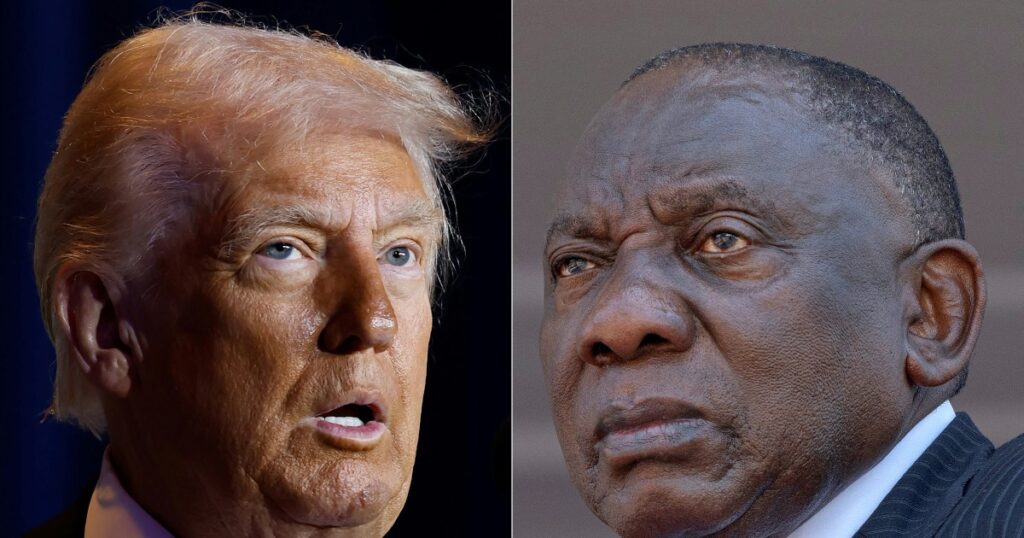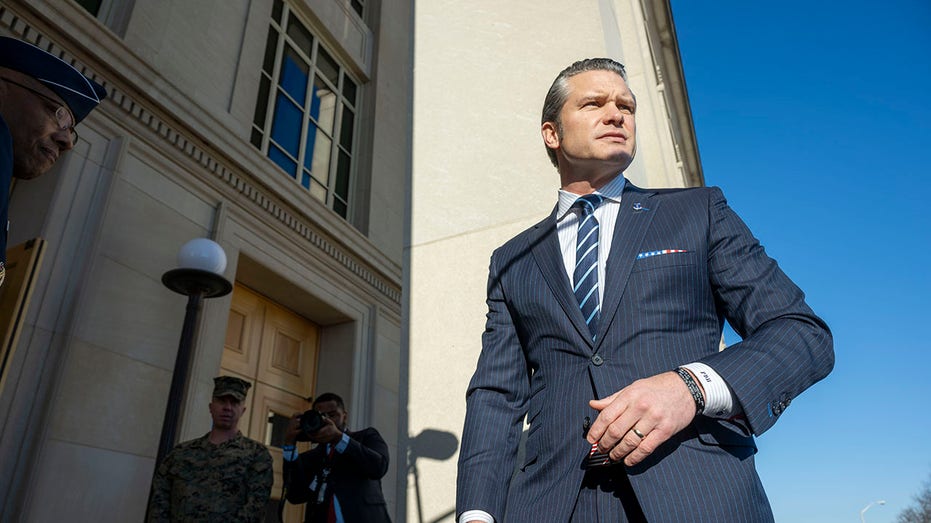Meet woman who left lucrative job to fulfill her uncle’s dream, cracked UPSC exam and became IPS Officer with AIR…

She hails from Sultanpur, Uttar Pradesh. Her success story is quite inspiring. Ariba cracked the UPSC exam on her fourth attempt.
Parvesh Verma, Dushyant Gautam, Vijender Gupta: Who will be next Delhi CM if BJP returns to power after 27 years?

With BJP’s victory appearing likely, several names are emerging as potential Chief Minister candidates
What does Trump’s ethnic cleansing proposal mean for ceasefire deal?

Washington, DC – Donald Trump has been claiming credit for the ceasefire deal that halted the war in Gaza, but the United States president’s proposal to forcibly displace the Palestinians in the territory risks torpedoing the agreement, experts say. Trump repeatedly called this week for Gaza to be depopulated — a push that rights groups say would amount to ethnic cleansing — and for the US to “take over” the Palestinian territory. Leaders across the world have warned that uprooting Palestinians from Gaza would destabilise the entire Middle East. More immediately, Trump’s comments could derail the push towards an enduring end to the fighting in the territory. “President Trump’s completely outrageous and outlandish calls for the ethnic cleansing of more than two million Palestinian people from Gaza severely undermines the chances for the continuation of the ceasefire,” said Josh Ruebner, a lecturer at Georgetown University’s Justice and Peace programme. “Of course, the ethnic cleansing of Palestinians was not in any ceasefire agreement, and by Trump putting that option on the table, he stands to wreck the very fragile process.” Advertisement The ceasefire came into effect on January 19, a day before Trump took office for a second term. But the US president has argued that his negotiating efforts, led by Middle East envoy Steve Witkoff, were instrumental to sealing the deal. Trump invoked the ceasefire in his inaugural address as he pledged to leave a legacy as a “peacemaker and unifier”. ‘We had nothing to do with it’ Days later, Trump suggested emptying Gaza of its inhabitants. Initially, it was easy to dismiss the comments as one of his off-the-cuff, hyperbolic pronouncements. But then he repeated them again and again. On Tuesday, he read prepared remarks that fleshed out his proposal while speaking alongside Israeli Prime Minister Benjamin Netanyahu at the White House. “The US will take over the Gaza Strip, and we will do a job with it, too. We’ll own it,” Trump said. Despite Trump’s comments, the ceasefire has continued to hold. The guns remain silent, and Hamas is set to release three more Israeli captives in the coming days in exchange for 183 Palestinians held by Israel. However, the US president’s proposal raises questions about the later stages of the truce deal, which include discussions about the future of Gaza. The first phase — which will see the release of 33 Israeli captives, a surge of humanitarian assistance to Gaza and partial Israeli withdrawal from the territory — is set to expire on March 1. The second stage is supposed to see a complete pullout of Israeli forces from Gaza, a permanent ceasefire and the release of all remaining captives held by Hamas. And the third stage includes a five-year reconstruction plan for Gaza. Advertisement Trump’s push for the people of Gaza to leave the territory altogether appears to be in direct contradiction with the spirit of the agreement. And there are signs that the US administration is no longer committed to all parts of the deal it has been bragging about brokering. On Tuesday, Trump’s envoy Witkoff suggested that Washington will push to complete the first two stages to free all Israeli captives. But he seemed to renege on the third stage — rebuilding Gaza — saying that it “can’t go the way that agreement talks about, which is a five-year programme”. Witkoff distanced the Trump team from the deal altogether, saying that it wasn’t “wonderful” from the start. “We had nothing to do with it,” he said. ‘It’s gone’ US officials have tried to walk back — or at least tone down — Trump’s comments, with White House spokeswoman Karoline Leavitt saying that people in Gaza would be “temporarily relocated”. Secretary of State Marco Rubio also said that the displacement of Palestinians in Gaza would be in the “interim”, and residents would be able to “move back in” after reconstruction. But the president has been reiterating almost daily this week that his plan is to permanently remove the Palestinians in Gaza and claim the territory for the US. Khalil Jahshan, the executive director of the Arab Center Washington DC, said Trump’s proposal spells doom for the ceasefire. “What we have heard from the White House this week, in my humble judgement, killed the ceasefire agreement totally. It’s gone,” Jahshan told Al Jazeera. Advertisement “It deprived the ceasefire agreement of its intended purpose: a solution for the day-after for Gaza and the people of Gaza. If the people of Gaza are going to be transferred ethnically to places from Indonesia to Albania to whatever, then what’s the purpose of proceeding?” Trump himself has suggested that the war may restart soon. “The strikes could start tomorrow,” Trump said on Tuesday. “There’s not a lot left to strike.” Since October 2023, Israel’s US-backed offensive in Gaza has killed nearly 62,000 Palestinians, including thousands of missing people who are presumed dead. But why did Trump emphatically claim credit for a ceasefire he did not intend on upholding? “Donald Trump isn’t interested in the ceasefire for the wellbeing of Palestinians,” said Khaled Elgindy, a Middle East analyst. “He’s interested in the headline of the ceasefire. He wants the credit. He wants to say, ‘I won. I’m the guy who did it.’ He doesn’t actually care if it’s implemented or if it falls apart or if it ends in ethnic cleansing.” Netanyahu’s war goals Elgindy said completing the second stage of the deal — a permanent ceasefire and Israeli troop withdrawal — will be vital for thwarting the ethnic cleansing plan. “There’s no question that the ceasefire, on its face, is totally incompatible with a plan to ethnically cleanse Gaza,” Elgindy told Al Jazeera. “This is why I think phase two is so critical. If we can get an agreement on phase two, and phase two is implemented, then I think the risk of actual ethnic cleansing is greatly diminished.” Advertisement Elgindy added that it doesn’t help the ceasefire that Trump “is talking crazy” about the future of Gaza, but
Seeking re-election, President Daniel Noboa centres Ecuador’s crime wave

Noboa has continued to weather controversy about the limits of his authority through the end of his latest campaign. Ecuador’s constitution requires that public officials take a leave of absence to run for re-election. But Noboa instead signed two executive decrees to avoid transferring power to his vice president, Veronica Abad, with whom he is feuding. Just this week, the Constitutional Court of Ecuador declared both unconstitutional. After the ruling, the Confederation of Indigenous Nationalities of Ecuador (CONAIE), a powerful Indigenous rights coalition, blasted Noboa for treating the presidency like “a private hacienda”. “No authoritarian manoeuvre can hide the truth: Noboa’s government is riddled with irregularities, abuses and contempt for democracy,” CONAIE wrote in a statement. “We have never trusted this government,” the acting president of CONAIE, Zenaida Yasacama, told Al Jazeera. “As a woman, his treatment of his vice president has hurt me.” Zenaida Yasacama, the acting president of CONAIE, an Indigenous organisation, expressed concern about Daniel Noboa’s government [Mie Hoejris Dahl/Al Jazeera] Still, Noboa has campaigned for a second, full term on the basis that he will declare war against “the old politics” of Ecuador. On advertisements, Noboa stands in a white T-shirt against a purple background, next to slogans for “one single round” — an appeal to voters to make Sunday’s victory so massive, no run-off election is needed. It’s a pointedly informal look, one designed to appeal to Ecuador’s younger generations. Garcia Nice explained that young voters are particularly fond of Noboa. Some even carry cardboard cut-outs of the leader. In a country where the average voting age is 28 and 16-year-old teenagers are eligible to vote, that demographic could provide a significant advantage at the polls. Yet, Noboa’s charisma as a young leader will only take him so far, Hurtado warned. If he succeeds in winning a full four-year term this year, he will no longer enjoy the benefit of the doubt that comes with being a relative newcomer to politics. “If he doesn’t resolve the country’s big challenges, his popularity will decline,” Hurtado said. Adblock test (Why?)
Trump freezes aid to South Africa amid spat over land expropriation law

United States President Donald Trump has frozen aid to South Africa in an escalation of a rift between his administration and Pretoria over a controversial land expropriation law aimed at tackling inequality stemming from apartheid. In an executive order signed on Friday, Trump said the law showed a “shocking disregard” for citizens’ rights and would allow the government to seize land from ethnic minority Afrikaners without compensation. The passage of the Expropriation Act, signed last month by South African President Cyril Ramaphosa, followed “countless” policies designed to dismantle equal opportunity, as well as “hateful rhetoric” and government actions that have driven violence against “racially disfavored” landowners, Trump said in his order. South Africa has also taken “aggressive positions” towards the US and its allies, including accusing Israel of genocide at the International Court of Justice (ICJ) and boosting relations with Iran, Trump said in the order. “The United States cannot support the government of South Africa’s commission of rights violations in its country or its undermining United States foreign policy, which poses national security threats to our Nation, our allies, our African partners, and our interests,” the US president said in the order. Advertisement Trump’s order also said his administration would promote the resettlement of Afrikaners “escaping government-sponsored race-based discrimination”. Trump and Ramaphosa have been engaged in an escalating war of words over the law since Sunday, when the US president accused his counterpart’s administration of “confiscating land” and mistreating “certain classes of people”. On Wednesday, US Secretary of State Marco Rubio said he would skip the upcoming Group of 20 (G20) talks in Johannesburg in response to the legislation and other “very bad things” happening in the country. Ramaphosa has insisted the law is not a “confiscation instrument” but part of a “constitutionally mandated legal process”, and argued that it will ensure public access to land in an “equitable and just manner”. In an address to parliament on Thursday that appeared to take aim at Trump, Ramaphosa said that his country would stand united amid a rise in the “pursuit of narrow interests” and “the decline of common cause”. “We will not be deterred. We are a resilient people. We will not be bullied,” he said. Under the expropriation law, the government may seize land without compensation where it is deemed to be “just and equitable and in the public interest”, such as in cases where it is not being used, and after efforts to reach an agreement with the owner have failed. Ramaphosa and his African National Congress have said the legislation is necessary to alleviate huge disparities in land ownership stemming from colonial settlement and the subsequent institution of racial segregation and white-minority rule. Advertisement The government has yet to expropriate any land under the law. The Democratic Alliance (DA), South Africa’s largest opposition party and a member of the ANC-led national unity government, has strongly criticised the law, casting it as a threat to property rights and much-needed foreign investment. The DA, which draws most of its support from white, Indian and multiracial South Africans, has also expressed concern about Trump’s threats and denied suggestions that the law allows land to be seized “arbitrarily”. Land ownership is a heated issue in South Africa due to the legacy of apartheid, which lasted from 1948 until 1994. Although Black South Africans make up more than 80 percent of the population, they own just 4 percent of privately owned farmland, according to a government audit conducted in 2017. White South Africans, who make up about 7 percent of the population and are divided between Afrikaans-speaking descendants of Dutch settlers and English-speaking descendants of British colonialists, hold about three-quarters of the land. Trump’s campaign against South Africa comes as his administration is clamping down on foreign assistance more broadly, including by effectively dismantling the US Agency for International Development (USAID). Washington allocated about $440m in assistance to South Africa in 2023, according to the most recent US government data. Adblock test (Why?)
Delhi Election Result 2025 Live Updates: Check full list of winners and losers in Delhi elections

Exit polls have projected a comeback for the BJP in Delhi after 27 years, with the party predicted to hit the majority mark of 36 comfortably and bag 10-15 more seats than that, ousting the incumbent Arvind Kejriwal-led AAP.
Delhi Election Result 2025: AAP’s Arvind Kejriwal vs BJP’s Parvesh Verma; key contests to watch out

Once postal ballots have been processed, the Electronic Voting Machines (EVMs) will be unlocked and counted in multiple rounds. So far, most of the exit polls predict the Bharatiya Janata Party (BJP) securing a comfortable majority to form a government in Delhi after 27 years.
Hegseth to look into ‘what went wrong’ in Afghanistan and pledges accountability, slams diversity motto

Defense Secretary Pete Hegseth on Friday addressed events in Afghanistan, saying they created the perception of “American weakness.” While speaking to the Department of Defense and Pentagon workforce during a town hall on Friday, Hegseth said America “deserves to take accountability for” events in Afghanistan, the Oct. 7 Hamas-led attack on Israel, and the war that was unleashed in Ukraine. “Chaos happens when the perception of American strength is not complete,” Hegseth said. “We aim to re-establish that deterrence.” PETE HEGSETH CONFIRMED TO LEAD PENTAGON AFTER VP VANCE CASTS TIE-BREAKING VOTE He discussed the three pillars he will focus on during his term – reviving the warrior ethos, restoring trust in the military and rebuilding it by matching threats to capabilities, and reestablishing deterrence by defending the homeland. Hegseth also spoke about the broken windows theory in policing, explaining that disregarding the small things in the military can create large problems. “I think the same thing exists inside our services – making sure at every level, there [are] standards and accountability, and that we live it at the highest levels,” he said. That is why, Hegseth said, the U.S. will look back at what happened in Afghanistan. He added the department will hold people accountable. “Not to be retrospective, not for retribution, but to understand what went wrong and why there was no accountability for it,” Hegseth said. Going forward, the military will find strength in unity, not diversity, according to Hegseth. “I think the single dumbest phrase in military history is ‘our diversity is our strength,’” he said. “Our strength is our shared purpose – regardless of our background, regardless of how we grew up, regardless of our gender, regardless of our race. WHITE HOUSE OPM ORDERS ALL DEI OFFICES TO BEGIN CLOSING BY END OF DAY WEDNESDAY In the department, Hegseth said everyone will be treated equally. “We will treat everyone with fairness,” he said. “We will treat everyone with respect.” CLICK HERE TO GET THE FOX NEWS APP Service members and department civilian employees will be judged by their merit, commitment to the team, and the mission, according to Hegseth.
Democratic AGs from 19 states sue Trump admin over DOGE access to sensitive, personal data at Treasury

Democratic attorneys general from 19 states have filed a federal lawsuit against the Trump administration over the Department of Government Efficiency’s (DOGE) access to sensitive, personal data belonging to Americans at the Treasury Department. The lawsuit claims the Elon Musk-run agency illegally accessed the Treasury Department’s central payment system at the Trump administration’s behest. On Thursday, the Treasury agreed to limit the Musk team’s access to its payment systems while a judge hears arguments in a previous lawsuit filed by a group of employee unions and retirees. The lawsuit, filed Monday, claimed Musk’s team violated the law by being given “full access” to the Treasury’s payment systems. FEDERAL JUDGE ORDERS LIMITED DOGE ACCESS TO SENSITIVE TREASURY DEPARTMENT PAYMENT SYSTEM RECORDS The payment systems have information about Americans’ Social Security, Medicare and veterans’ benefits, tax refund information and much more. U.S. Treasury Secretary Scott Bessent told FOX Business Wednesday the concerns are not valid. “DOGE is not going to fail,” he said. “They are moving a lot of people’s cheese here in the capital, and when you hear this squawking, then some status quo interest is not happy. “At the Treasury, our payment system is not being touched. We process 1.3 billion payments a year. There is a study being done — can we have more accountability, more accuracy, more traceability that the money is going where it is? But, in terms of payments being stopped, that is happening upstream at the department level.” ELON MUSK DUNKS ON SEN. CHUCK SCHUMER, DECLARING ‘HYSTERICAL REACTIONS’ DEMONSTRATE DOGE’S IMPORTANCE DOGE was launched to root out wasteful spending in the government, and it has already come close to closing the U.S. Agency for International Development (USAID). The lawsuit was filed in New York by the office of New York Attorney General Letitia James, a vocal Trump critic. It includes attorneys general from Arizona, California, Colorado, Connecticut, Delaware, Hawaii, Illinois, Maine, Maryland, Massachusetts, Minnesota, Nevada, New Jersey, North Carolina, Oregon, Rhode Island, Vermont and Wisconsin. “President Trump does not have the power to give away Americans’ private information to anyone he chooses, and he cannot cut federal payments approved by Congress,” James said in a statement. “Musk and DOGE have no authority to access Americans’ private information and some of our country’s most sensitive data.” CLICK HERE TO GET THE FOX NEWS APP Treasury officials on Wednesday denied violating privacy laws, saying only two members of the DOGE team had been given “read-only” access to information in the payment systems. The Associated Press and Reuters contributed to this report.
Transgender people sue Trump administration over new passport policy eliminating ‘X’ gender marker

A group of transgender people is challenging the Trump administration’s new policy that prevents the issuing of passports with sex designations that do not match an applicant’s biological sex at birth. Seven people represented by the American Civil Liberties Union filed a lawsuit claiming the policy violates privacy and First Amendment rights. In 2022, the State Department allowed passport applicants to select M, F or X for sex. “The plaintiffs in this case have had their lives disrupted by a chaotic policy clearly motivated by animus that serves zero public interest,” said Sruti Swaminathan, staff attorney for the ACLU’s LGBTQ & HIV Project. “Our clients need to travel for work, school and family, and forcing them to carry documents that directly contradict what they know about themselves to be true — or withhold those documents altogether — is a blatant effort to violate their privacy and deny them their freedom to be themselves.” INDIANA JUDGE RULES PRISON MUST PROVIDE TRANSGENDER SURGERY FOR INMATE WHO KILLED BABY The rule came after President Donald Trump signed an executive order promoting the “biological truth.” The order, “Defending Women from Gender Ideology Extremism and Restoring Biological Truth to the Federal Government,” declares that the U.S. will recognize only two sexes — male and female — based on immutable biological characteristics. It prohibits the use of gender identity in legal and administrative contexts and mandates that federal agencies, including those overseeing housing, prisons and education, adhere to this definition when enforcing laws and issuing regulations. The order directs changes to government-issued identification documents, bans the promotion of “gender ideology” in federal programs, rescinds previous executive actions that promoted gender identity inclusion and instructs federal agencies to eliminate guidance or regulations that conflict with the new policy. TRUMP SIGNS EXECUTIVE ORDERS BANNING ‘RADICAL GENDER IDEOLOGY,’ DEI INITIATIVES IN THE MILITARY It mandated the requirement that government-issued identification documents “accurately reflect” the holder’s sex, defined as “male” or “female.” In a statement released by the ACLU, Reid Solomon-Lane, one of the plaintiffs, said he’s lived his whole adult life as a man. “Everyone in my personal and professional life knows me as a man, and any stranger on the street who encountered me would view me as a man,” Solomon-Lane said. “Now, as a married father of three, Trump’s executive order and the ensuing passport policy have threatened that life of safety and ease. “If my passport were to reflect a sex designation that is inconsistent with who I am, I would be forcibly outed every time I used my passport for travel or identification, causing potential risk to my safety and my family’s safety.” Fox News Digital has reached out to the White House and State Department. The ACLU said it’s been contacted by more than 1,500 transgender people or family members, “many with passport applications suspended or pending, who are concerned about being able to get passports that accurately reflect their identity.”

